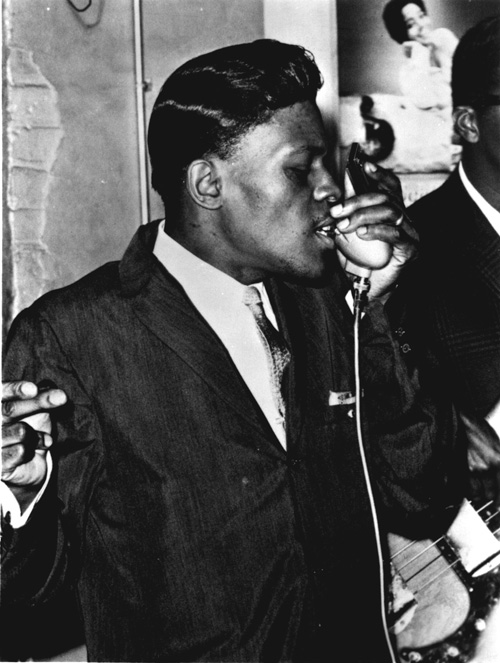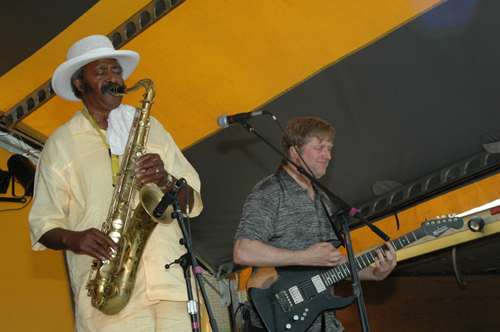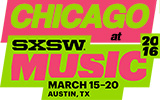| « The Constellations shine @ Empty Bottle, 6/13 (and a contest) | Friday Quick Links » |
Feature Thu Jun 10 2010
Keeping the Blues Alive: The State of Chicago Blues
[This article was submitted by freelance writer Emi Peters.]
With the 27th annual Chicago Blues Festival kicking off Friday, and Eric Clapton's sold-out Crossroads Guitar Festival right around the corner, it's important to take a look at how much one of Chicago's top tourist attractions has changed since the musical genre's heyday in the 1950s and '60s. The Chicago blues sound is equal parts electric and soulful. It has inspired countless numbers of musicians and gave birth to rock 'n' roll. The blues is one of the purest forms of American music, and Chicago became the place to turn it on its head and make the blues its own.
Some 60 odd years ago, it was pretty customary to be able to drive through Chicago's South and West sides and see an immense number of blues clubs and juke joints, such as the Flamingo Lounge, Gatewood's Tavern and The Flame Club. Inside, one could find patrons dancing and singing along to some of the rawest, grittiest and sweatiest music the city has ever known. Smoke-filled, dimly lit rooms overcome with loud electric guitar and soulful crooning could carry on until the wee hours of the morning. Chicago blues wasn't just another sub-genre of music, though -- it was also very much a release for African Americans looking to escape the hardships and discrimination encountered in daily life.
Today, the number of blues clubs in the predominantly African-American neighborhoods of the South and West Sides has dwindled significantly. Many of the establishments that once played host to iconic blues men and women such as Howlin' Wolf, Muddy Waters, Little Walter, Junior Wells and Koko Taylor now cease to exist, as well as the aforementioned legends that frequented them.

Junior Wells c. mid-1960s (photo by Raeburn Flerlage courtesy Delmark Records)
In the 1980s and '90s, Chicago's blues scene saw a major shift. While clubs were dying out in the South and West Sides, there was a whole new crop popping up downtown and on the North Side due to a renewed interest in blues music courtesy of The Blues Brothers, and a wider acceptance of the genre among white audiences thanks to mainstream musicians like Eric Clapton and Stevie Ray Vaughan.
"In the 1950s, at least until the early '60s, if you wanted to hear a good blues band, you had to go to a black neighborhood, to a tavern or club," says Bob Koester, founder of Delmark Records, one of Chicago's last remaining blues labels. "Now most of the better music is on the North Side, [where musicians play] to white people."
David Grazian, the author of Blue Chicago: The Search for Authenticity in Urban Blues Clubs, compares the North Side clubs to "Hollywood movie sets" -- establishments that are "in the business of producing middle-class fantasies of urban life, both thrilling and dark." Most notably, Kingston Mines on Halsted and Blue Chicago on Clark Street cater to the out-of-towners who either aren't hip to or are too apprehensive to make the trek to the more "authentic" blues clubs on the South and West Sides (such as Lee's Unleaded Blues, Checkerboard Lounge).
"On the surface, [North Side clubs] feel ramshackle and rusty -- the barstools are worn out, the plaster is falling off the walls, and the floor seems barely mopped," Grazian says in an interview with the University of Chicago Press. "But if one pans across their dimly lit rooms, one begins to notice the bouncers with their headsets; the souvenir shops loaded with t-shirts, trinkets, and other tourist trap fare; and the well-heeled out-of-towners who arrive by limousine and tour bus, oblivious to the fact that many of these seemingly dilapidated clubs are located in some of the richest neighborhoods in the city, including Lincoln Park and the Near North Side...in reality, most of these places feel more like Disneyland with booze."
The musicians that play in these clubs are no stranger to the contrived atmosphere of changing times, either. As the South and West Sides struggle to bring in patrons who seem to have a diminishing interest in a community sound that was so dearly revered before, the downtown and North Side clubs are thriving on tourists who want to hear nothing but the hits.
"All they know how to ask for is 'Mustang Sally' and 'Sweet Home Chicago,'" says Dave Weld, a Chicago-based musician and Delmark artist playing at the Blues Festival on Friday. "And then of course there's the ones that don't even know how to ask for that and want 'Stairway to Heaven' and you just have to grin and bear it."

Dave Weld (right) on guitar with Abb Locke (Howlin' Wolf, Magic Sam, Otis Rush) on saxophone (photo courtesy Delmark Records).
Weld, a white guitarist and lead singer of his band, The Imperial Flames, says he had a hard time earlier in his career when trying to book gigs in the North Side clubs because of the color of his skin. He says clubs like Kingston Mines and Blue Chicago were looking for a certain image when it came to the bands they booked. According to Weld, bands with black male leaders or female singers attracted customers to the clubs and appeared to have a more authentic quality. Weld also says it is very hard to break into the local blues scene, which he refers to as "cliquey." However, he was able to find acceptance in the black blues clubs and neighborhoods where musicians like the late J.B. Hutto mentored him.
[mp3] Dave Weld and the Imperial Flames - "Rambin'" from Burnin' Love
Despite the setbacks, the blues will always have a very special place in Chicago's proverbial heart. The history is here, and will remain. With the recent opening of Buddy Guy's Legends' new state-of-the-art club (at 700 S. Wabash, in the old HotHouse location) and this year's Chicago Blues Festival expecting an estimated 600,000 people or more, the blues is being kept alive.
The Chicago Blues Festival (courtesy City of Chicago, Mayor's Office of Special Events)
"People from all over the world come to help celebrate the blues tradition," says Barry Dolins, deputy director of the Mayor's Office of Special Events and coordinator for the Chicago Blues Festival since its inception in 1984. "Blues is basically about letting your hair down and having a good time and that's why I think it's been able to transcend just the African-American community and is appreciated and felt by so many people."
The 27th annual Chicago Blues Festival will take place this weekend, June 11 to June 13 in Grant Park. As always, admission is free and open to the public. For a list of scheduled performers, visit ExploreChicago.org.
—Emi Peters
~*~
This feature is supported in part by a Community News Matters grant from The Chicago Community Trust and the John S. and James L. Knight Foundation. More information.
















Kevin Johnson / June 11, 2010 10:47 AM
Nice job, Emi! Thank you!
Hope you make it out to the Fest!